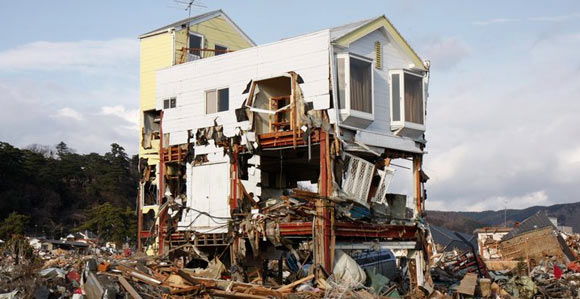
At 2:46 p.m. on March 11, 2011, Michie Okada was working at a daycare center located in a higher area of Ofunato when the first tremor occurred just as the staff was going to wake the children up from their naps.
A magnitude-9.0 earthquake had originated 80 miles (128 km) east of Sendai, Japan, located 112 miles (180 km) away from Ofunato.
Sister Okada and the other teachers instructed the pajama-clad children to place futons over their heads, and they exited the building as the shaking continued. Staff and children hurried outside in their bare feet onto the snow-dusted playground.
Parents began to pick their children up at 3:00 p.m., but the tsunami had begun to push inland and inundate low-lying areas, preventing many from returning home. Sister Okada, along with children who could not go home, spent that night in a classroom of a nearby elementary school that had been converted into an evacuation shelter. There was no heat, and temperatures dropped severely that night. They brought with them the same futons they had initially taken outside of the daycare center, folding them across one another to rest.
“While I wanted the night to be over, I also felt afraid to see the situation in the light of day,” Sister Okada said.
Transportation routes had been cut off, but Sister Okada was able to get into Rikuzen-Takata, just 10 miles (16.3 km) away, where her family home was, around noon the next day. Just after the earthquake she had received an e-mail from her parents on her phone, notifying her that they had evacuated to a relative’s home that was located on somewhat higher ground.
When she arrived at the relative’s house, however, she saw that the tsunami had caused it to lean far to one side.
“I was simply shocked that [the tsunami] had come that far,” Sister Okada said. “There was really nothing left [of the city of Rikuzen-Takata]. It was . . . impossible to tell where the ocean ended and the land began. . . . I didn’t feel sadness or pain—I couldn’t feel any emotion.”
Sister Okada was able to reunite with her family safely, and none of her relatives had died as a result of the disaster, but her best friend, a city hall employee, had perished.
Sister Okada’s home was less than 10 minutes by foot from the sea—close enough to hear the waves at night. Her older sister lived across the street. Their homes and possessions were completely swept away by the tsunami, leaving only foundations behind.
“I feel like I had been surrounded with useless material things,” she said. Comparing herself to those who lost families or jobs and don’t know what is going to happen to them from one day to the next, she said, “I feel loved by the Lord and blessed. My sister, my brother-in-law, and I all have jobs, cars, and safe families; all we lost was our home.”
Sister Okada now lives with her family in a sports facility-turned-shelter in the foothills of Rikuzen-Takata. She travels from there to work at the daycare center. When she returns home from work around dusk, food is being cooked in the parking area next to the shelter. She brightly greets the elementary school-age boys running around near the entrance, asking, “Did you have a fun day?” Many of the children have lost their fathers.
In addition to her role on the shelter’s cleaning team, Sister Okada tries each day to “be an example to those around me, and to talk with the children and the elderly people,” she said.
The Church has donated relief supplies, and it has become widely known in the shelter that Sister Okada is a Church member. The people in the shelter think positively of her membership and of the Church.
“We received relief aid from not only the Church, but from people from all over the world,” Sister Okada said. “I hope to try and pay them back by staying on the Lord’s path to the end. … I testify that the Lord’s love bears me up.”
